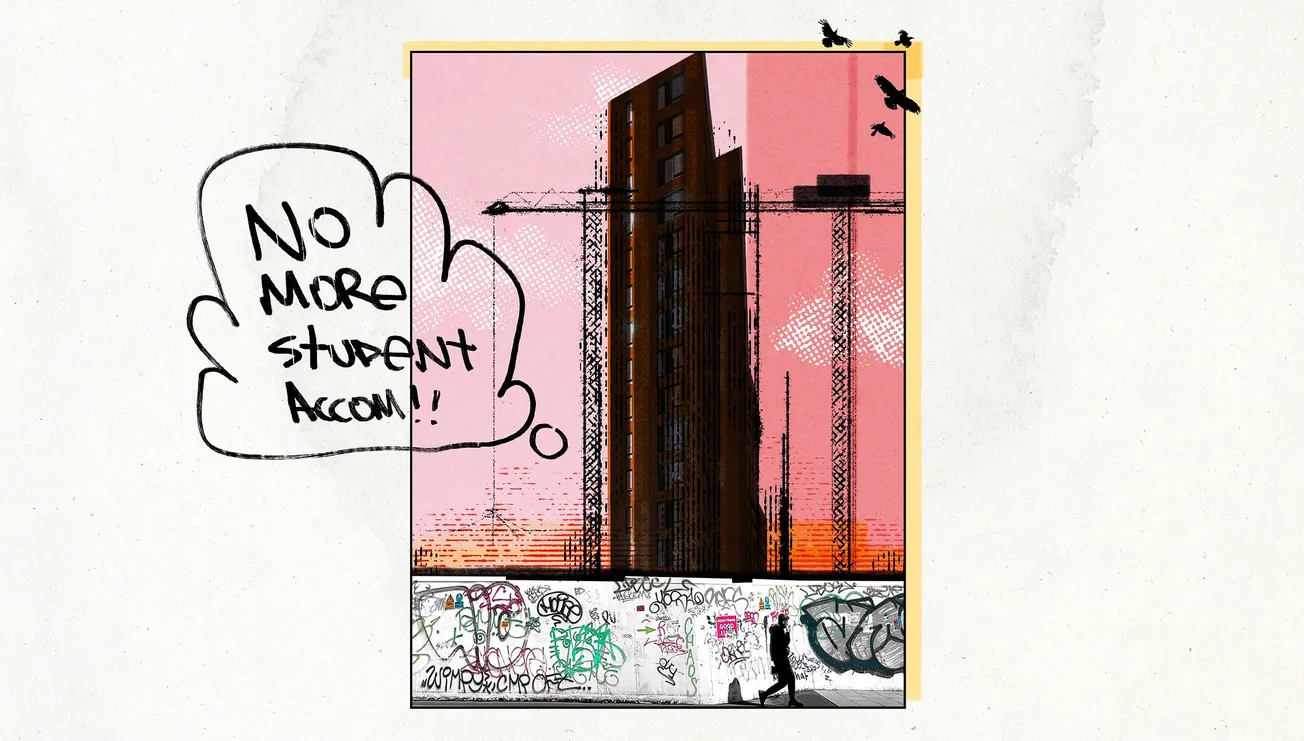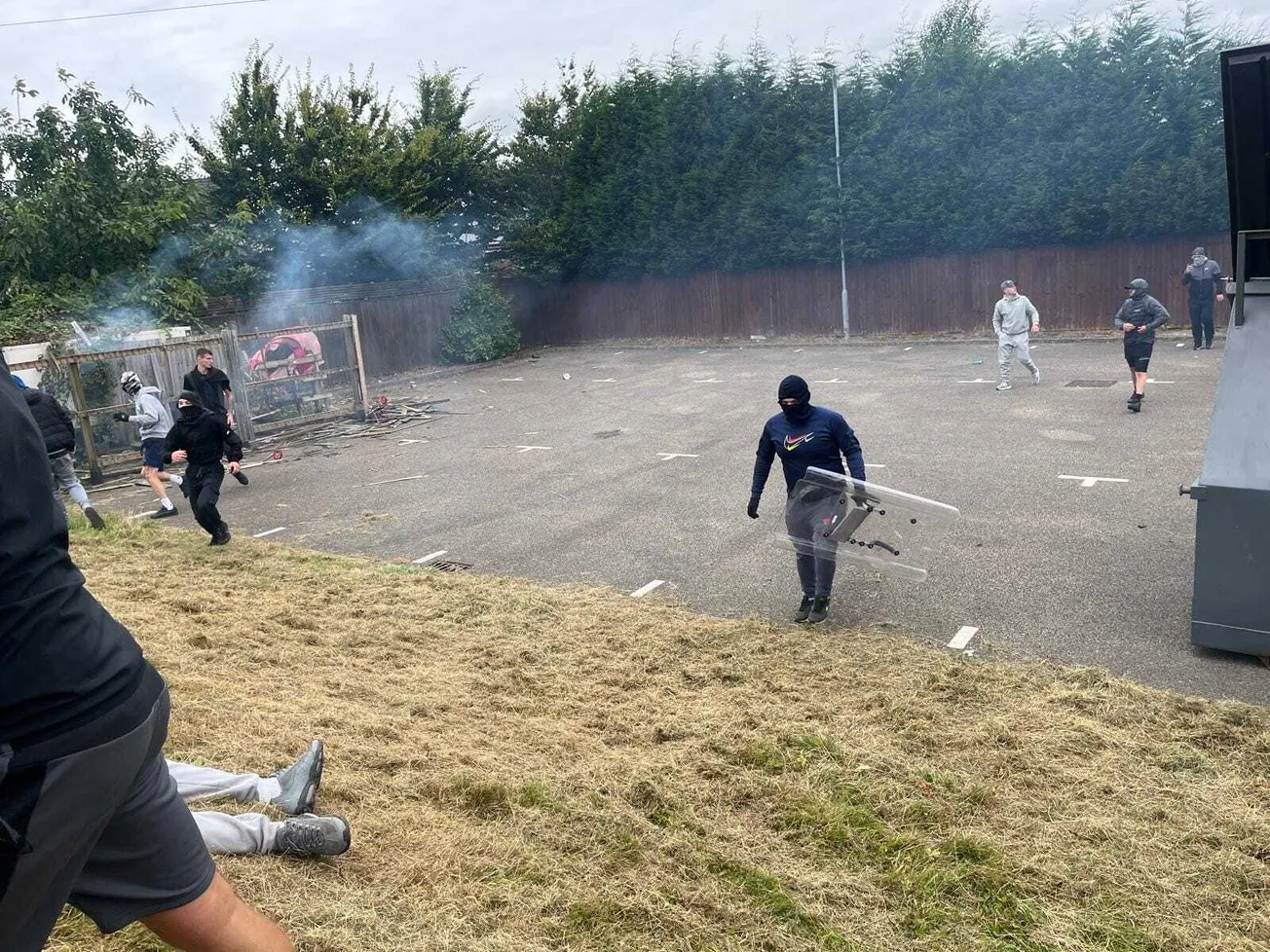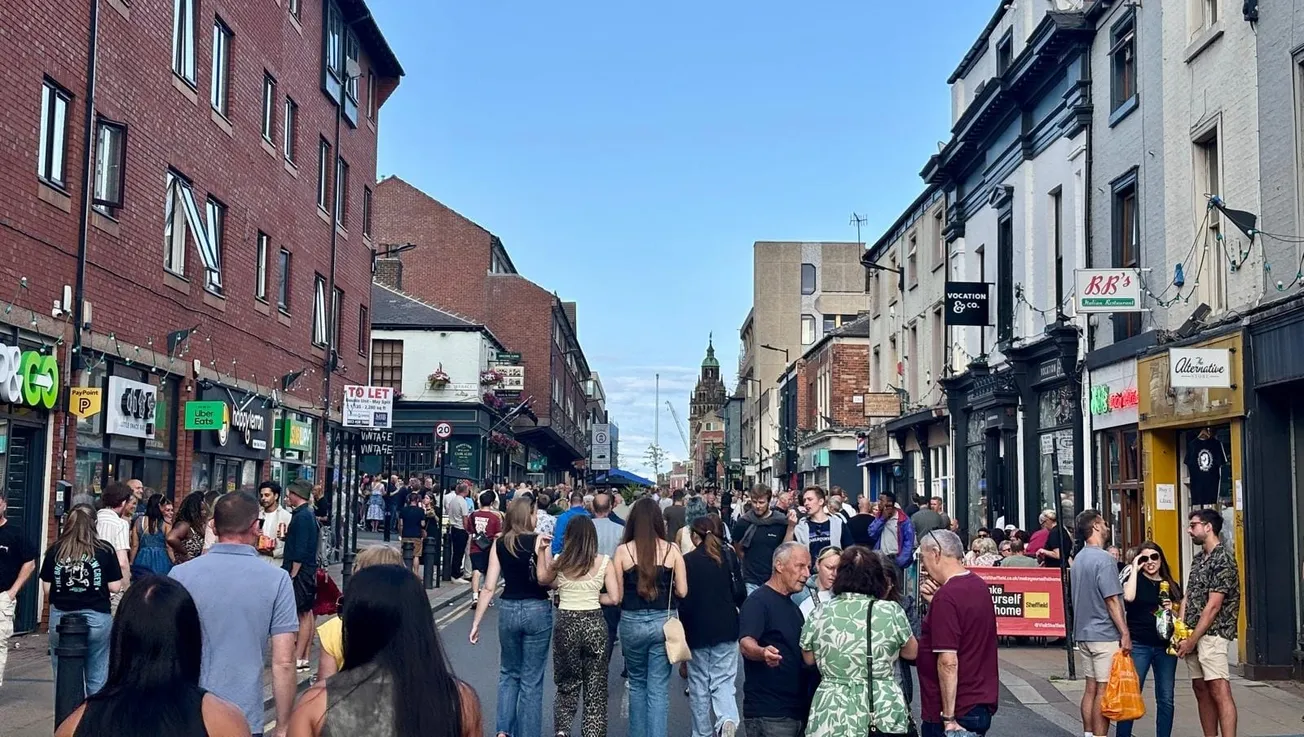In the three years we’ve been up and running, The Tribune has had messages from all over the UK and across the world. Many Sheffielders are keen to keep in touch with their ancestral roots, meaning we’ve had correspondence from a few ex-pats in Australia and the odd émigré from the United States. We even have at least one reader in Finland. All part of the great Sheffield global diaspora.
Even so, it was a surprise to see an email from Argentina land in our inbox. “Hi Sheffield Tribune, my name is Pablo Mateo from Argentina,” read the email from 24 June. “I invested in the Vista Student Accommodation, Pond Street, Sheffield, S1 2BG project developed by Mount Property Group.”
As Pablo explained, Mount Group Student Vista Ltd — the firm he’d invested in, which was financing the building — had gone into administration, with a court having appointed an administrator to handle the finances of the firm in April 2024. Nearly two months later, in June, Pablo received a proposal from the administrator which recommended the unfinished building be sold back to Mount Property Group, the parent company of the firm that had started building it in the first place.
“I am very frustrated since all my savings are at risk,” he continued. “As far as I researched a few weeks ago, this developer recently had other developments stalled and under administration therefore I start to believe this was a scam or a fraudulent scheme.”

The Vista building is so close to my Park Hill flat that I can actually see it from my bedroom window (I’d like to assure readers that is not the only reason I am interested in this story). While some in Sheffield recoil at new skyscrapers going up, I actually quite like tall buildings, so it was exciting to see it taking shape on the skyline. Building work started in January 2021. First came a latticework of concrete, followed by insulation panels and window panes. Finally, grey brickwork began creeping up the building. It felt like it was just a few months from completion.
And then, nothing.
Even before the proposed completion date — 2022 — building work on the project had slowed down. But earlier this year, the work stopped for good. In the last six months, the site has resembled the Mary Celeste. The huge yellow crane that I can still see from my flat stopped moving, while the hive of activity I witnessed whenever I walked past disappeared overnight. What was a dusty and noisy environment became eerily quiet and sterile. It reminded me of those half-built Spanish holiday resorts that were left to rot after the 2008 financial crisis.
Following Pablo’s email, I decided to take a walk from Park Hill down to Pond Street to take in the building. When I stop outside the Penny Black pub and look up at the looming tower, a Royal Mail worker comes out for a cigarette. She’s only been working in the area a few months, but has never seen any work taking place and wondered about what’s happening with the deserted site. “It looks like one day they’ve just abandoned it,” she says.

The manager of the Penny Black pub knows a bit more — but not much. He says the building started during Covid, and that some of the construction workers used to come in and have a pint after their shifts had finished. But he says that no one has been on site since April. “The bank took ownership and stopped them working on it,” the manager tells me. He’s also worried about the condition of the building, which is still largely exposed to the elements. “It’ll be a mess inside now,” he adds. “Full of pigeon shit.”
A customer who claims to know a bit about construction points out the rust developing on the metal runners on which the platforms move. “That crane will cost £250,000,” he says. “And there is a security guard on 24/7.” Whether his numbers are totally correct or slightly exaggerated by drink, it sounds like a lot of money to spend just to see the empty building stand idle.
Pablo Mateo asked me to do some digging for him. It turns out that Mount Property Group is owned by Yerolomi Chrysokhou (he generally goes by the name Michael Chrysokhou instead), a 32-year-old Liverpool-based property developer. Out of six of Chrysokhou’s larger projects in Liverpool (94 Townsend Lane, Camden House, Natex, Browside, Innovo) and Sheffield (Vista), four have gone into administration before being completed. Chrysokhou is trying to buy back both Vista and Browside out of administration.
So how normal or abnormal are those figures? Property development in general is notoriously risky — meaning the chances of going bust are higher than for the average business. This can be connected to planning problems, poor project control, cost overruns and delays, amongst other factors. Generally, the smaller the developer (and the shallower their financial resources), the riskier it becomes. While four failures out of six visible big projects would be a poor track record for a big mainstream developer, Mount Property Group is a one man band with very little cash in the bank — and as such, their hit rate may not be as surprising as it first seems. I tried to reach out to Mount Property Group for their side of the story on multiple occasions. Unfortunately, I never received a response.

The administrators’ reports on both buildings describe a similar sequence of events. First, investors like Pablo make an application to a court to buy the project out of bankruptcy. After all, they don’t stand to make any profits until the building is completed — so understandably, they want to move things along. However, just before the date scheduled for the hearing (coincidentally or not, in both cases it was two days before), a company called Phoenix Money steps in and exercises its right to appoint its own administrator as Mount’s primary lender. While this raises the possibility that the developer is acting in concert with the lender, there is still no suggestion anything illegal has taken place.
The above is complicated and technical — but effectively, it’s about control. The development has gone into administration and the investors are trying to get ownership (buy it back from the administrators) so they can control what happens to the building. The developer doesn’t want that to happen, as they would then lose control. Phoenix Money is Mount’s major lender so has a big financial stake in the building. They don’t want to lose control either. Two days before the court hearing Phoenix says they want to appoint their own administrator who they think will be more likely to favour them rather than the investors. Two months later the new administrator agrees to sell it back to Mount. While this isn’t illegal it does raise the suggestion that the developer and its lender are working together to keep the investors out, as both would lose control over what happens to the building.
Purpose-built student accommodation (PBSA) has been around for a long time, but it was only in the 2010s that the market really began to boom. When the Manchester-based developer Opal went bust in 2013 with debts of £880m and 48 buildings containing 20,000 beds, it sparked a gold rush to snap up the newly available rooms. These included Opal 1, 2 and 3 in Sheffield, which were bought by Greystar Real Estate Partners and giant American investment bank Goldman Sachs. Where Goldman went, others followed, and American institutional investors began to get heavily involved in the PBSA market. Now lots of student flats in Sheffield are owned by international pension funds, including some by state-run teachers’ pension funds from Canada. The chances are that if you have a private pension, some of the money in it will have been invested in purpose-built student accommodation.
But Pablo is neither Goldman Sachs nor a pension fund. How did one private individual end up putting his money into a PBSA? The model Mount used to fund Vista is known as “fractional ownership”, where many sole investors contribute relatively small amounts of money to fund large buildings. Pablo put his money into Vista after seeing online adverts which promised consistent healthy returns on his investment. He says he remembers being quoted a guaranteed net yield of more than 7%.

“They were promised assured rents with rising capital value and no effort,” says Carl Lee, an expert on purpose built student accommodation. “It’s the rentier dream. You just bank the cheques.”
As someone who recently completed a PhD entitled “The Market Formation of Private Sector Purpose Built Student Accommodation in Sheffield 2000-2019”, Lee feels like the right person to speak to on the subject. After looking at the publicly available court filings, he says that only 65 of Vista’s 241 flats have been sold to investors, at an average price of £79,000 — meaning only 27% of the development had been bought at the time work began. “It’s amazing they started building the thing,” he says. “It was completely unviable.” While there is no magic figure for when a building becomes viable, the idea is to raise as much capital in advance of construction as possible so that any borrowing needed to complete the development is kept to a minimum. Of the 65 investors, Lee says that the vast majority will be international investors who will have been told that the UK university accommodation market was a predictable cash cow.
Fractional ownership has been used by other student accommodation providers in Sheffield, such as Vita Student, to successful effect. Vita owns the former Telephone House building on Charter Square, which despite being the most expensive student accommodation in Sheffield, is always full. Carl Lee says that investors in Vista — which may well have been named to make it sound like the successful Vita building — were sold this myth and fell for it.
“We have this idea that everyone can be a winner,” says Lee. “Well no, they can’t. This is capitalism and you are gambling with your money. Sometimes you win and sometimes you lose. Nothing Mount has done is illegal. Morally dubious, yes. Sharp practice. But not illegal.”

Lee says the only way out will be if the investors do what happened at Mount’s Natex development in Liverpool. There, an organisation called Blacklight Capital Partners told investors they would finish the building if they sold it to them. The building was completed and has proved popular with students. Before the sale, the investors had been looking at getting just 15p back for every pound of their investment but actually ended up making a profit.
He doesn't think the same will be possible with Vista, however. Both Sheffield universities are struggling to recruit Chinese students these days, who are now less likely to study in the UK because of what they perceive as a hostile political environment and the fact that Chinese universities are improving all the time. The number of Nigerian students has also been hit by the collapse of the Nigerian currency, while Indian students prefer to study in the United States. On top of all that, the overall number of UK students is declining too. “We’re at the top of the curve and the only way is down,” says Lee.
What happens to Mount Property Group and its investors is one thing. But there is a third party in all this: the city of Sheffield and its inhabitants. Having a half-finished building spoiling its skyline isn’t exactly what a “city on the up” would want. As such, Sheffield City Council has a strong interest in making sure the building is finished. This isn’t the first time the city centre has been placed in peril by unfinished building work. The Nebula building on Hanover Way was funded almost entirely by investors from Hong Kong, who were taking money out of the country illegally to evade tax. After the developer went into administration in 2015, it lay unfinished for six years — before finally being completed in 2021, after it was bought out of administration and finished by new developers.
Carl Lee says there could be alternative uses for Vista, such as accommodation for asylum seekers. But whatever happens, it’s likely to be several years before we see a completed building. “I imagine it will be around six years before Vista is finished too,” he says. “I’d be interested to know what Sheffield City Council’s planning department thinks.”

If Pablo Mateo has lost money, and Sheffield has to suffer a blot on its skyline for up to six years, has Mount Property Group lost out as well? If they have taken a financial hit, it begins to look like a property deal gone bad, of the kind that happens every day. But if they have profited by buying the project out of administration, it begins to look a bit fishier. So which is it?
The truth is, it’s probably too early to tell. The least you can say is that Mount wouldn't bother buying back in if they didn't think they could still make money on the project. Young entrepreneurs like Chrysokhou don't start out with large amounts of cash. The reason they're involved is that a particular set of circumstances — low interest rates, property fever, naïve foreign investors — make it possible for hungry deal-doers to get involved despite not having much cash. That in turn means there's probably a sucker involved. In the case of the fractional sale business model, the sucker was the international investor (like poor Pablo). Pablo and other smaller investors like him provide people like Chrysokhou with the upfront funding they need, on poor terms. If things go wrong, the Chrysokhous can come back in after bankruptcy while squeezing out the Pablos in the process. The hit that the Pablos take, then, actually benefits the Chrysokhous — and it's all perfectly legal.
Bankruptcy manoeuvring like this has always gone on, but it’s become more common over the last 20-30 years, as the financialisation of the property market has grown. Of six big Chrysokhou projects, four have gone bust. Of those four, it looks like he’s washed his hands of two of them, in which case he's probably lost money. The other two he's been able to buy back (Vista and Browside), so he still hopes to make money on them. Two of the original six have not gone bust, so presumably he still hopes to make money on those too.
When one of these deals works, Chrysokhou will probably expect to make significant multiples of his cash investment. If four of them end up working while he loses on two, he may still come out significantly ahead. That is the cold-blooded maths.

This all started with an email from Argentina, which turned into a story about how student accommodation has become a global business in which some people get burned. Investor Pablo Mateo trusted those he gave his money to, but is now struggling to find out what has happened to it. “I feel really unprotected by the system itself,” he says. “You invest important amounts of your savings in a real estate project and suddenly everything is gone.”
Along with some 400 other investors, he is now calling for a full investigation into Mount’s practices. But Carl Lee suggests they will find this difficult. “People have to accept this is the way things work,” he says. “If something seems too good to be true, it probably is too good to be true.”
What do you think about Mount Property Group, and the student accommodation market in general? As always, members can join the debate in the comments section.
Comments
How to comment:
If you are already a member,
click here to sign in
and leave a comment.
If you aren't a member,
sign up here
to be able to leave a comment.
To add your photo, click here to create a profile on Gravatar.







